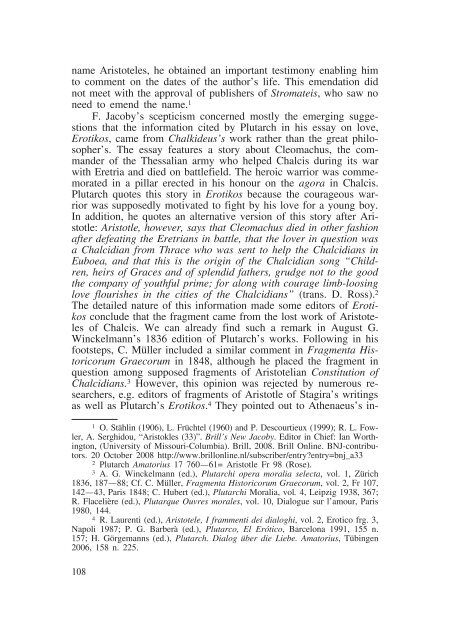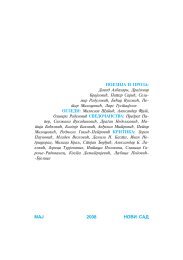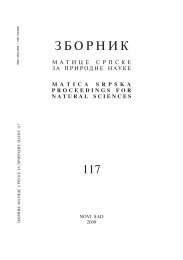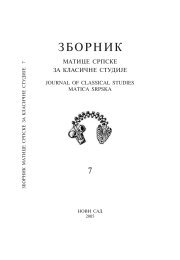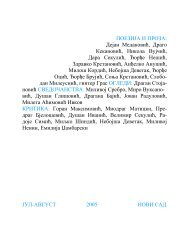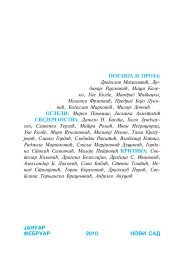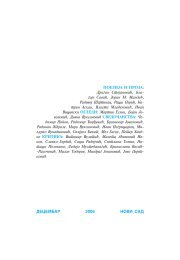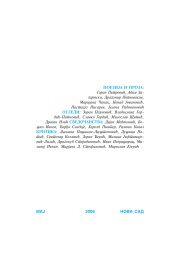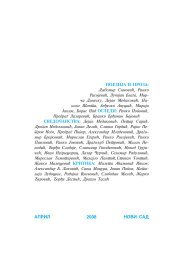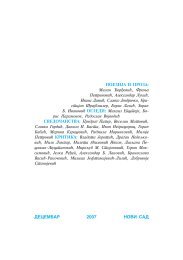You also want an ePaper? Increase the reach of your titles
YUMPU automatically turns print PDFs into web optimized ePapers that Google loves.
name Aristoteles, he obtained an important testimony enabling him<br />
to comment on the dates of the author's life. This emendation did<br />
not meet with the approval of publishers of Stromateis, who saw no<br />
need to emend the name. 1<br />
F. Jacoby's scepticism concerned mostly the emerging suggestions<br />
that the information cited by Plutarch in his essay on love,<br />
Erotikos, came from Chalkideus's work rather than the great philosopher's.<br />
The essay features a story about Cleomachus, the commander<br />
of the Thessalian army who helped Chalcis during its war<br />
with Eretria and died on battlefield. The heroic warrior was commemorated<br />
in a pillar erected in his honour on the agora in Chalcis.<br />
Plutarch quotes this story in Erotikos because the courageous warrior<br />
was supposedly motivated to fight by his love for a young boy.<br />
In addition, he quotes an alternative version of this story after Aristotle:<br />
Aristotle, however, says that Cleomachus died in other fashion<br />
after defeating the Eretrians in battle, that the lover in question was<br />
a Chalcidian from Thrace who was sent to help the Chalcidians in<br />
Euboea, and that this is the origin of the Chalcidian song “Children,<br />
heirs of Graces and of splendid fathers, grudge not to the good<br />
the company of youthful prime; for along with courage limb-loosing<br />
love flourishes in the cities of the Chalcidians" (trans. D. Ross). 2<br />
The detailed nature of this information made some editors of Erotikos<br />
conclude that the fragment came from the lost work of Aristoteles<br />
of Chalcis. We can already find such a remark in August G.<br />
Winckelmann's 1836 edition of Plutarch's works. Following in his<br />
footsteps, C. Müller included a similar comment in Fragmenta Historicorum<br />
Graecorum in 1848, although he placed the fragment in<br />
question among supposed fragments of Aristotelian Constitution of<br />
Chalcidians. 3 However, this opinion was rejected by numerous researchers,<br />
e.g. editors of fragments of Aristotle of Stagira's writings<br />
as well as Plutarch's Erotikos. 4 They pointed out to Athenaeus's in-<br />
1 O. Stählin (1906), L. Früchtel (1960) and P. Descourtieux (1999); R. L. Fowler,<br />
A. Serghidou, “Aristokles (33)". Brill's New Jacoby. Editor in Chief: Ian Worthington,<br />
(University of Missouri-Columbia). Brill, 2008. Brill Online. BNJ-contributors.<br />
20 October 2008 http://www.brillonline.nl/subscriber/entry?entry=bnj_a33<br />
2 Plutarch Amatorius 17 760—61= Aristotle Fr 98 (Rose).<br />
3 A. G. Winckelmann (ed.), Plutarchi opera moralia selecta, vol. 1, Zürich<br />
1836, 187—88; Cf. C. Müller, Fragmenta Historicorum Graecorum, vol. 2, Fr 107,<br />
142—43, Paris 1848; C. Hubert (ed.), Plutarchi Moralia, vol. 4, Leipzig 1938, 367;<br />
R. Flacelière (ed.), Plutarque Ouvres morales, vol. 10, Dialogue sur l'amour, Paris<br />
1980, 144.<br />
4 R. Laurenti (ed.), Aristotele, I frammenti dei dialoghi, vol. 2, Erotico frg. 3,<br />
Napoli 1987; P. G. Barberà (ed.), Plutarco, El Erótico, Barcelona 1991, 155 n.<br />
157; H. Görgemanns (ed.), Plutarch. Dialog über die Liebe. Amatorius, Tübingen<br />
2006, 158 n. 225.<br />
108


